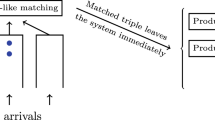Abstract
We study the mean sojourn times in two M/G/1 weighted round-robin systems: the weight of a customer at any given point in time in the first system is a function of its age (imparted service), while in the second system the weight is a function of the customer’s remaining processing time (RPT). We provide a sufficient condition under which the sojourn time of a customer with large service requirement (say, x) and that arrives in the steady state is close to that of a customer which starts a busy period and has the same service requirement. A sufficient condition is then provided for continuity of the performance metric (the mean sojourn time) as the quanta size in the discrete time system converges to 0. We then consider a multi-class system and provide relative ordering of the mean sojourn times among the various classes.
Similar content being viewed by others
References
Avrachenkov, K., Ayesta, U., Brown, P., Núñez-Queija, R.: Discriminatory processor sharing revisited. In: Proceedings of IEEE INFOCOM (2005)
Bansal, N., Harchol-Balter, M.: Analysis of SRPT scheduling: Investigating unfairness. In: Proceedings of ACM Sigmetrics (2001)
Borst, S.C., Boxma, O.J., Núñez-Queija, R., Zwart, A.P.: The impact of the service discipline on delay asymptotics. Perform. Eval. 54, 175–206 (2003)
Chen, X., Heidemann, J.: Preferential treatment for short flows to reduce Web latency. Comput. Networks 41, 779–794 (2003)
Coffman, E.G., Muntz, R.R., Trotter, H.: Waiting time distributions for processor-sharing systems. J. Assoc. Comput. Mach. 17, 123–130 (1970)
Fayolle, G., Mitrani, I., Iasnogorodski, R.: Sharing a processor among many job classes. J. Assoc. Comput. Mach. 27, 519–532 (1980)
Feng, H., Misra, V., Rubenstein, D.: PBS: A unified priority-based scheduler. In: Proceedings of ACM Sigmetrics (2007)
Floyd, S.: HighSpeed TCP for large congestion windows. RFC 3649, Experimental (2003)
Harchol-Balter, M., Sigman, K., Wierman, A.: Asymptotic convergence of scheduling policies with respect to slowdown. Perform. Eval. 49, 241–256 (2002)
Harchol-Balter, M., Schroeder, B., Bansal, N., Agrawal, M.: Size-based scheduling to improve Web performance. ACM Trans. Comput. Syst. 21, 207–233 (2003)
Jacobson, V.: Congestion avoidance and control. ACM SIGCOMM Comput. Commun. Rev. 25, 157–187 (1995)
Kelly, T.: Scalable TCP: Improving performance in Highspeed Wide Area Networks. ACM SIGCOMM Comput. Commun. Rev. 32, 83–91 (2003)
Kherani, A.A., Kumar, A.: The lightening effect of adaptive window control. IEEE Commun. Lett. 7, 284–286 (2003)
Kherani, A.A., Núñez-Queija, R.: TCP as an implementation of age based scheduling. In: Proceedings of IEEE Infocom, pp. 1–12 (2006)
Mandjes, M., Zwart, B.: Large deviations for sojourn times in processor sharing queues. Queueing Syst. 52, 237–250 (2006)
Nuyens, M.: The foreground-background queue. Ph.D. Thesis, University of Amsterdam (2004). Available from http://www.few.vu.nl/~mnuyens/publications
Nuyens, M., Wierman, A.: The foreground–background queue: A survey. Perform. Eval. 65, 286–307 (2008)
Padhy, S., Kherani, A.A.: Tail equivalence for some time-shared systems. In: Proceedings of Valuetools (2006)
Rai, I.A., Urvoy-keller, G., Vernon, M., Biersack, E.W.: Performance analysis of LAS-based scheduling disciplines in a packet switched network. In: Proceedings of ACM Sigmetrics, pp. 106–117 (2004)
Righter, R., Shanthikumar, J.G.: Scheduling multiclass single server queueing systems to stochastically maximize the number of successful departures. Probab. Eng. Inf. Sci. 3, 323–333 (1999)
Righter, R., Shanthikumar, J.G., Yamazaki, G.: On extremal service disciplines in single-stage queueing systems. J. Appl. Probab. 27, 409–416 (1990)
Schassberger, R.: On the response time distribution in a discrete round-robin queue. Acta Inform. 16, 57–62 (1981)
Schassberger, R.: A new approach to the M/G/1 processor-sharing queue. Adv. Appl. Probab. 16, 202–213 (1984)
Schrage, L.E.: A proof of the optimality of the shortest remaining processing time discipline. Oper. Res. 16, 687–690 (1968)
Solan, I.H.: Quadrature methods for integral equations of the second kind over infinite intervals. Math. Comput. 36, 511–523 (1981)
Wolff, R.W.: Stochastic Modeling and the Theory of Queues. Prentice Hall, Englewood Cliffs (1989)
Yang, C.W., Shakkottai, S.: Asymptotic evaluation of delay with the SRPT scheduler. IEEE Trans. Automat. Contr. 51, 1848–1854 (2006)
Author information
Authors and Affiliations
Corresponding author
Additional information
A preliminary version of this work appeared in the Valuetools 2006 conference. This work was done when the author was with the department of Computer Science and Engineering, Indian Institute of Technology Delhi, New Delhi, India.
Rights and permissions
About this article
Cite this article
Kherani, A.A. Sojourn times in (discrete) time shared systems and their continuous time limits. Queueing Syst 60, 171–191 (2008). https://doi.org/10.1007/s11134-008-9092-7
Received:
Revised:
Published:
Issue Date:
DOI: https://doi.org/10.1007/s11134-008-9092-7




